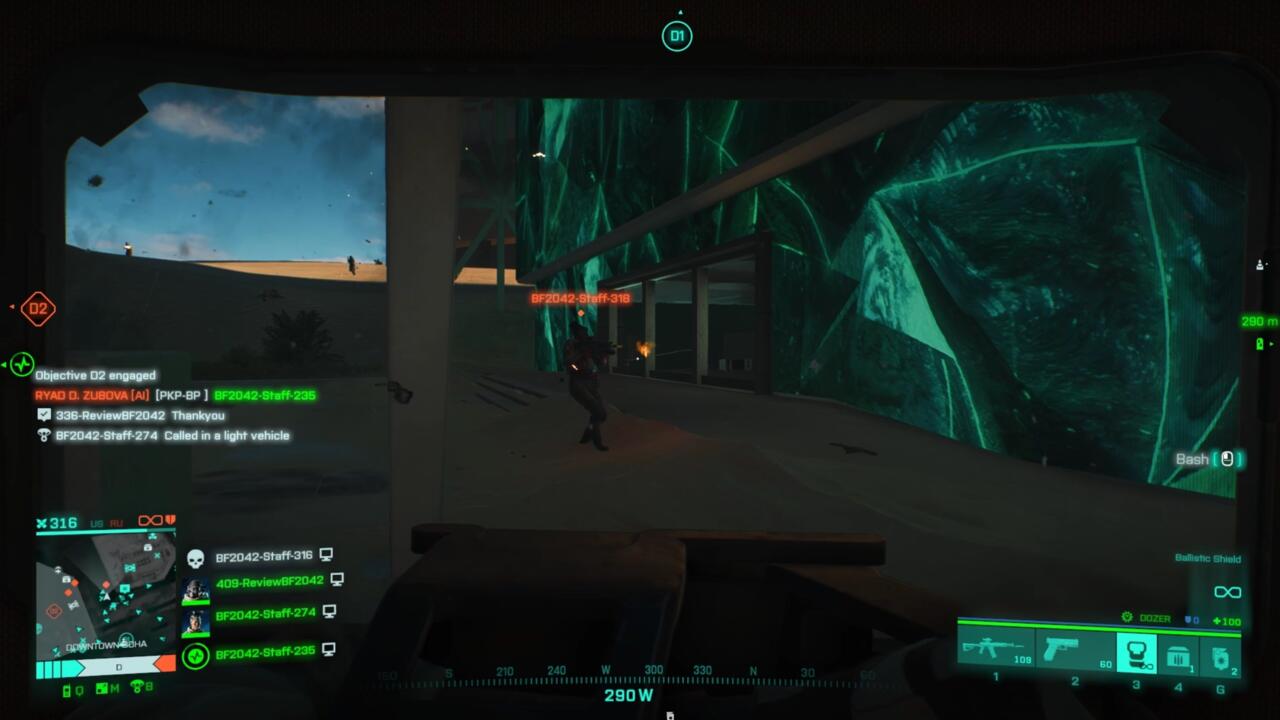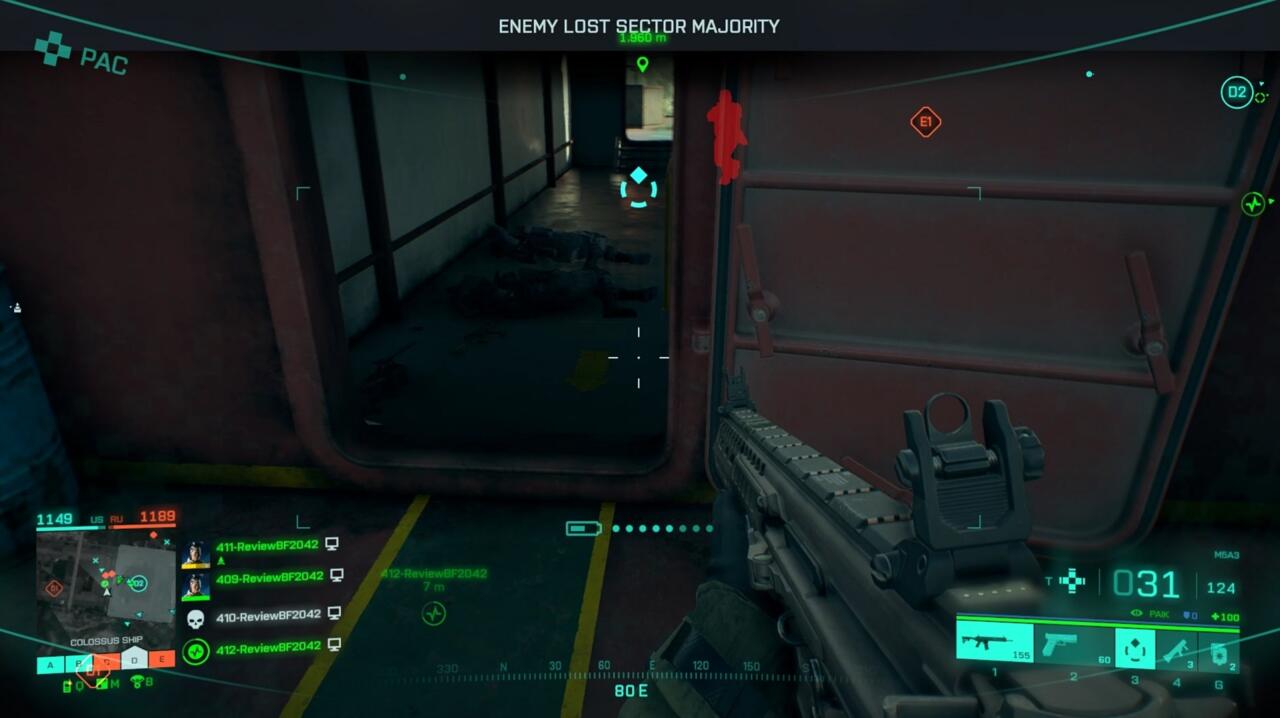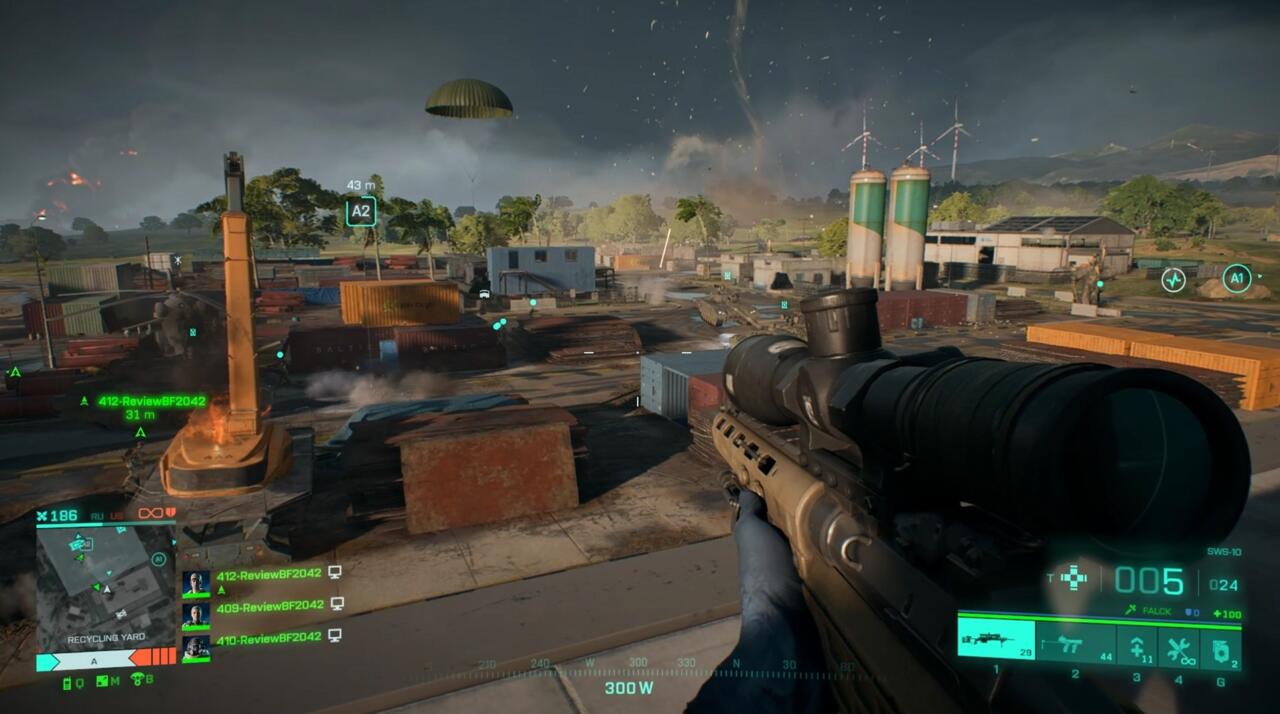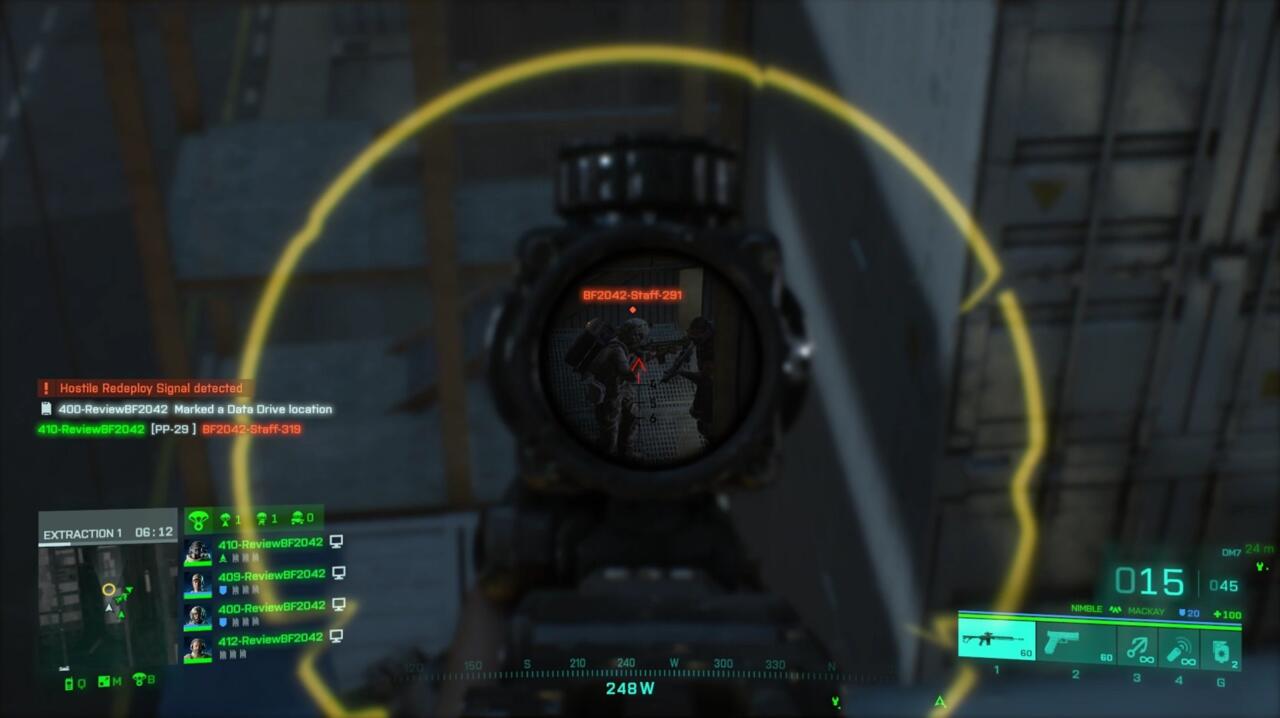Sometimes, everything in Battlefield 2042 just clicks. Playing the new Hazard Zone mode, my squad entered the frightfully dangerous shipping yard on Manifest, a map defined by a big port. The stacks of shipping containers lining the sides of the area can create a lethal bottleneck, and as we approached the objective ahead, we spotted another squad converging on the location as well.
As the recon fighter Mackay, I pulled out my Batman-like grapple gun and zipped up to the top of the container stack--which suddenly turned the cover-less kill zone of an alley into a perfect ambush location. One of my teammates threw down deployable cover for the group below, giving them a good spot to avoid incoming fire where none previously existed. While my squad on the ground distracted the enemies, I crawled to the edge of the container above them and started picking the enemy squad off. Another teammate deployed a scanner that let them see nearby enemies through walls, putting a stop to the last opponent before they could flank our team. Working in concert, we wiped the enemy squad in seconds, before they even knew what they were dealing with.
Battlefield 2042 is at its most fun when it brings new ideas together with the franchise's traditional feel. And although many of its elements work well together-- there's not always harmony between the old and the new. Battlefield 2042 distinguishes itself from past games in the franchise by offering you the opportunity to play specific "specialists"--each with their own unique abilities and gadgets--rather than choosing from broader, more generic character classes. Not all of those specialists feel like they work in every match, though. Mackay is essential on Manifest, where he can take advantage of the map's verticality in a way other specialists can't, but he feels close to useless on Hourglass, where half the map is flat, open desert, and the other half is a cityscape littered with massive skyscrapers. Similarly, with high takeoff points, wingsuit-sporting Sundance is highly effective on Hourglass, but not especially helpful on Renewal, where there are far fewer places to take to the air.
In our time with Battlefield 2042, there were many moments where having the right specialist for the job felt great--and a few where some characters felt useless on a particular map. It illustrates how the game can sometimes struggle as developer DICE expands it away from its underlying formula. Still, while some ideas and characters don't necessarily feel like they jive with everything Battlefield 2042 has to offer, its steps forward add new dimensions to the game overall, and expand on what already works about the franchise's first-person shooter battles by pushing you to play in different ways.
Specialists are the biggest addition in Battlefield 2042, representing an adjustment in the choices you make about how you'll face off against other players. Where Battlefield previously had squads composed of players taking on different roles, like medic, assault, engineer, or recon, the specific specialists you can choose from fill those roles in 2042. So while multiple characters might be considered support or assault class specialists, each is distinct from the others. It gives Battlefield 2042 a more hero shooter feel, taking pages from games such as Overwatch or Rainbow Six Siege.
Veteran Battlefield players might chafe at the idea of hero shooter sensibilities intruding on their military sim FPS, but the addition of specialists in Battlefield 2042 is often one of its highlights. Especially when working closely with your squad, having a variety of specialists and knowing how to use them well creates a lot of situations where you can help each other out. Battlefield is generally an FPS best enjoyed with friends, utilizing communication and teamwork, and the ways that different specialists can synergize and support the group brings out the team play experience in a lot of new ways.

What's more, playing with different characters gives you vastly different gameplay experiences. Flying around the battlefield with a wingsuit as Sundance or zipping up to high ground as Mackay is pretty far removed from pushing toward an objective with a riot shield as Dozer, sprinting through fire to save a hurt squaddie as Falck, or setting up an ambush with a sentry turret as Boris. Because of their different abilities and uses, each specialist brings their own specific feel to Battlefield 2042, offering you a lot of different kinds of fun even in a single match.
As mentioned, the addition of specialists isn't always perfect--a few feel out of place on certain maps. There's also the constant shooter problem where exciting characters that earn high kill counts, like Paik with her ability to see through walls for short periods, will undoubtedly draw more use than support-leaning or more stationary characters like Falck, Angel, or Boris. But DICE has promised to add more specialists in the future, and there's enough diversity of gameplay experience in the cast already that seeing additions and recombinations in how they work together is an exciting prospect.
While different approaches to gameplay mostly come from your choice of specialist, they're supported through Battlefield 2042's highly customizable gear loadouts. Your kit comes with a primary gun and a secondary sidearm, as usual, although now you're able to use any gun with any character. You can also pack a few other tactical items, including grenades or rocket launchers. There are generic loadouts for each class, which give you items like a deployable medpack if you choose the medic kit or a vehicle repair tool if you choose the engineer kit, but you can also adjust these at any time. That means you can play Boris with a sniper rifle and an anti-aircraft missile, climb to the top of a skyscraper, and use your deployable sentry turret to protect you while you snipe enemies on the ground and helicopters in the air. Or you can grab an SMG and a respawn beacon as Mackay, using your grapple to quickly cut distance on enemies and kill them up close, before dropping a beacon on the high ground so your squad can easily follow you on an attack.
Having a broad opportunity to adjust what gear you're carrying, even within a match, is a big plus in the quality-of-life column for Battlefield 2042. In addition to loadout customization, there's also the new "Plus" menu system, which allows you to set several attachments for your guns in the loadout screen and then change them on the fly as you play. If you're headed into some tight hallways, you can quickly swap your assault rifle's long-range scope for iron sights and toss on a suppressor to cover the sounds of your shots. If you're facing a vehicle, you can pull out your anti-infantry rounds for armor-piercing bullets. The ability to use any weapon at almost any time, combined with customizing your gear for the situation you're up against, makes you feel like both an important part of a team with a specific job, and a versatile fighter ready for a variety of situations.

Speaking of quality-of-life changes, there's nothing quite as nice as the new call-in tablet that lets you summon a vehicle just about anywhere. Battlefield is known for its expansive maps that take a lot of time to cross, and seeing a huge open field ahead of you and calling in a jeep or a tank to cut down the time needed to cross it is excellent. Level design in Battlefield 2042 is generally geared toward getting you into the fight more quickly than in the past, with maps designed for "clustering" that drives the action to specific locations, but just having the ability to get into the action as soon as possible (while lessening the likelihood of getting pegged by a sniper on your way to the actual fight) feels like a major improvement to Battlefield overall.
Battlefield 2042 forgoes the single-player campaign altogether, instead focusing entirely on competitive multiplayer. At launch it includes three different types of competitive modes, each offering surprisingly different experiences. The more traditional are the All-Out Warfare modes, Breakthrough and Conquest. Both center around huge armies of as many as 128 players attempting to capture control points in various "sectors" as they fight for victory. Conquest remains as fans remember it from past games, with the goal being to exhaust the enemy's respawn tickets by killing opponents and capturing control points; the more points you hold, the more the opposing team bleeds tickets. Battlefield 2042 carries the slight adjustment that requires your team to often capture several control points in a specific "sector" in order to completely capture it and gain its advantage, providing more opportunities for a losing team to turn the tides and more places where skirmishes can kick off.
Conquest, like in past Battlefield games, can feel chaotic and haphazard, with players streaming in from all directions at all times and plenty of opportunities to get picked off by someone you didn't see. That can be increased by Battlefield 2042 feeding in "Occupying Forces," which are AI-controlled soldiers who fill out a game's player roster if there are gaps. The AI bots are not especially smart, but they do help make matches feel like enormous battles with a huge number of combatants.
Breakthrough, on the other hand, is a more streamlined, tuned version of the experience, not unlike Battlefield: Bad Company 2's Rush mode, but on a larger scale. One team attacks while the other defends, but only one sector is active on a map at a time. The attacking team has to capture all the control points in the sector in order to advance to the next, but they have limited respawns with which to do so, while the defending team has infinite respawns. Breakthrough feels like a more action-heavy, straightforward gametype compared to Conquest, where you always know roughly where the enemy will come from and where the action will be, making huge maps feel less daunting. Where Conquest is a huge and free, if confusing, experience, Breakthrough is a smaller, tighter, more predictable one.

In both All-Out Warfare modes, though, battles often seemed to come down to which team was smarter and better at using vehicles. That's not really surprising given Battlefield's history--vehicles tend to dominate pretty often in the franchise, and in our playtime, we could go on ridiculous tears with the right tank or Wildcat. Still, it's something that feels like it'll need tuning, as while there are a couple of specialists specifically equipped to deal with vehicles, they still tend to roll over players (sometimes literally) who don't have many good options to deal with them.
Battlefield 2042's other two modes, Hazard Zone and Portal, take a very different tack from more traditional Battlefield modes. Hazard Zone is a 32-person, squad-based free-for-all mode that's a bit of a riff on battle royale games, but with a more objective-oriented flavor. Your squad of four heads into a map with the goal of seeking out and pilfering hard drives from crashed satellites. Capturing drives earns you special Dark Market Credits you can spend on your loadout between matches, as does killing opposing players and Occupying Forces. To get the credits from the drives, however, you need to reach an extraction point and board a plane. If you die in the mode, you're dead for good, unless a squadmate can survive long enough to use an "uplink" device found on the map to summon you back into the fight.
Hazard Zone's mixture of battle royale and free-for-all ideas makes it a standout experience, particularly when you add in the specialists. Unlike in other modes, your squad can only have one of each specialist on it during a Hazard Zone match, so working together to decide on a strategy and which abilities best fit your team's game plan is important. Where the All-Out Warfare modes are huge and messy, Hazard Zone is a much more strategic and close-knit experience, and it works beautifully with all the different customization and specialization elements at play.
The drawback of Hazard Zone is that winning begets winning. The more credits you earn in a match, the better your chances of being well-outfitted in the next match, because you can use those credits to buy tactical upgrades like uplinks for saving squadmates or faster health regeneration for yourself. Dark Market Credits are also necessary to buy anything other than the base assault rifle, pistol, and grenade--if you want a sniper rifle, you need the funds to buy it, and it'll only last for one match. Unlike other battle royale games, though, the slate isn't wiped clean with every new match; you're rewarded for having done well in your last run. So the more you win, the more advantages you get to take forward. It's frustrating to get sniped right out of the gate of a match, for instance, when you didn't even have the option to buy a sniper rifle of your own.

Finally, there's Portal, which fills out Battlefield 2042's multiplayer match offerings with seemingly endless variety. The mode allows players to create matches and gametypes of their own using a web-based editor and make them available to the community to play. The editor is impressively robust--Portal allows you to do easy things like change the rules of a match so that players can run faster or only use certain weapons, but there's also an in-depth logic editor that lets you create much more involved contingencies. DICE demonstrated its capabilities by creating a rocket launcher-only match that required players to jump up and down in order to reload their weapons, which led to some ridiculous chaos as a pair of players would miss their initial bout with explosives and descend on each other in a desperate knife fight.
Portal also opens up the options by allowing you to mix elements of Battlefield 1942, Bad Company 2, Battlefield 3, and Battlefield 2042 together in matches. The games have all been streamlined somewhat to feel similar to 2042, so there's parity between forcing the soldiers of World War II on one team to fight those of the near future on another. Still, the mixing of different games and their weapons, gadgets, vehicles, and classes means the community can create a whole host of different experiences. The possibilities add a great deal of variety to Battlefield 2042's offerings at launch, which would otherwise feel a bit thin with only All-Out Warfare and Hazard Zone.
Perhaps the bigger draw, at least initially, will be the opportunity to play 128-player battles on old Battlefield game maps, with their original classes, weapons, and rules intact. We ran through a smattering of matches borrowed from the older games, and each brought a rush of nostalgia with it as we played those Battlefield classics. They notably lack some of the quality-of-life improvements of Battlefield 2042, and a lot of Portal's mixed-up modes feel like they'll mostly be good for laughs. But like the customization options and specialists in the 2042 portion of the game, Portal offers a bunch of new ways to expand on the core Battlefield experience.
It must be noted that Battlefield 2042 has been pretty buggy in the days following its launch. Things have improved since the review event and early access period thanks to a Day 1 patch, but problems persist. Players have documented a whole host of issues, from weapons and characters not loading, to enemy players freezing instead of falling when they die. Sometimes scopes just don't magnify, or you can't revive a teammate because the prompt never appears on screen. And sometimes, bullets just don't seem to work against some players.

My experience with Battlefield 2042 on PC has been buggy but playable, and none of my issues have been game-breaking. Servers have felt pretty stable and glitches were mostly just momentary annoyances. But your mileage may absolutely vary when it comes to these problems, especially given the other, much more troublesome issues players have documented online. It seems like the experience might be worse on console than on PC, but at least for the time being and before more patches are released, you're going to see bugs.
It's also an open question as to DICE's live-game approach to Battlefield 2042 after its launch. With no single-player campaign, DICE has said it'll still be telling a story in the game's world through the seasonal addition of new specialists and content. The developer has also said that it'll be adding more elements to Portal, depending on feedback it receives from the Battlefield community. A live-game approach seems like it could offer a lot of additional gameplay variety to 2042 over time, but we'll have to see how DICE's approach works out, in building its world, adding new variety through its specialists, and offering new opportunities for creativity.
What's really impressive in Battlefield 2042 is the variety that's on offer. It lets you play a bunch of different kinds of FPS experiences--in different game modes, in different Portal rule sets, and even in the same match as you switch between characters. Portal lets you relive the Battlefield games of the past, but on the 2042 side, DICE has cherry-picked from popular trends like hero shooters and battle royales. The best part is that, mostly, it has done a really effective job of curating those additions so that they bring more to what players already like about Battlefield, rather than change what already works.


















